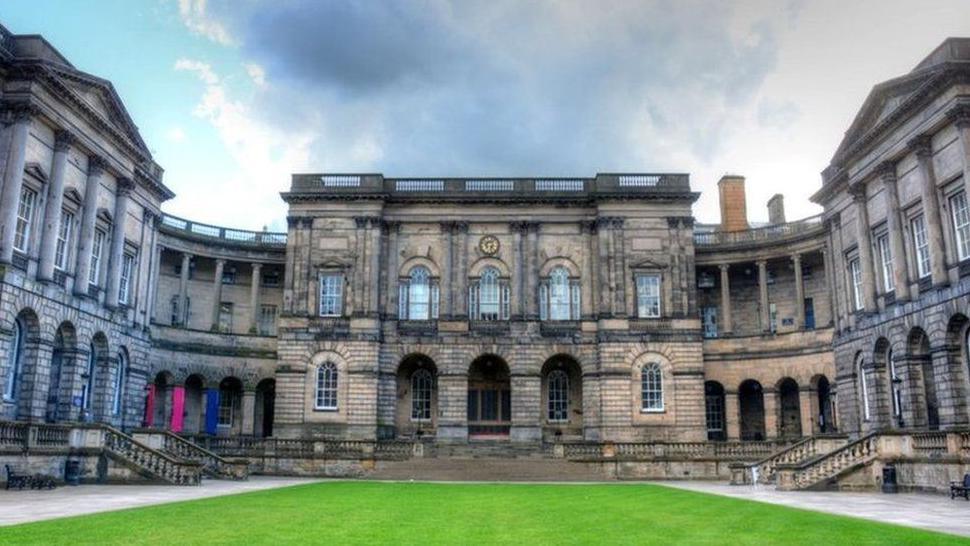Edinburgh University warns students not to be 'snobs'
Olivia Gallosi and Roni Sharp said they had come across discrimination
- Published
Edinburgh University has warned students from privileged backgrounds not to be "snobs" towards their peers from Scottish and working-class backgrounds.
The institution admitted class-related prejudice was a problem on campus.
It said individuals from less well-off backgrounds were being "inadvertently or deliberately shamed by more privileged students".
The guidance was issued, external after the newly-formed Scottish Social Mobility Society complained lecturers and students regularly mocked and mimicked individuals from north of the border.
"At the University of Edinburgh students who come from middle to lower socioeconomic backgrounds are in a minority," it said. "However, in wider UK society they are the majority."
Examples of shaming included comments about "clothing and lack of knowledge or regional accents".

There are currently 50,000 students at Edinburgh University
About 26% of Edinburgh's students are from Scotland, while more than 70% are from England, the rest of the UK or overseas.
Those attending private schools make up 40% of the intake from UK institutions.
One student quoted in the guidance said they had been told by their peers "you can't be working class because you're at university".
"We were discussing inheritance tax in class and people have explicitly said that they have more money because they 'just work harder', the student said.
Ordinary Scots rejected by university, says MSP
- Published12 January 2023
Olivia Gallosi, from Inverness, is a third-year student at Edinburgh University.
She told BBC Scotland News she had come across discrimination.
"A lot of people turn their nose up at you if you didn't go to private school," she said.
"I've got a slight English accent because I was born there so people are nice and then they find out I'm actually Scottish and then their opinion changes.
"I've got friends who refused to come to Edinburgh because they didn't want to put up with the treatment of Scottish students so they went to surrounding unis because it is way worse here than anywhere else."
Roni Sharp said she was aware of the problem "straight away" - as soon as she moved into halls of residence.
"When I was in first year I had a job and people were very judgemental about it.
"They were like why are you working you're supposed to be having fun and I was like 'I've got rent to pay'.
"Scottish students find that a lot here at Edinburgh University.
"There needs to be more awareness of embracing everyone's pasts and cultures."

Shanley Breese founded the Scottish Social Mobility Society
Shanley Breese, a law student who founded the Scottish Social Mobility Society, said that when she arrived at the university she had never heard of private schools.
She set up the group so her Scottish peers had somewhere to go to feel they could fit in.
She said it started in Freshers week when she was asked constantly what school she had gone to.
"And I would say you won't know the school, it's in Dumfries and what they were actually referring to was what private school did you go to," she said.
She said that, as a result, it was really hard to make friends and figure out the culture.
"It was a really isolating experience and there was no community to turn to," she said.
Shanley said it was hard to meet other Scottish students because most commuted as they had been priced out of town.
She said creating the society created a space where Scottish students could communicate their experiences.
"I felt so stupid and out of place for not knowing private schools existed and so it affected my academic ability," she said.
'Atmosphere of elitism'
"There is an atmosphere at the university of elitism," Shanley added.
She said she had been ridiculed.
"My accent has changed so much since starting at uni because I was getting comments if I said a word like 'canny'. They liked to point it out."
She also said tutors would ask Scottish students to repeat themselves or to speak more clearly.
"Accent bias is one of the biggest issues. And they made assumptions from our accents on our intelligence levels and whether we would be friends or not," she said.
A University of Edinburgh spokesman said: "We are incredibly proud of our diverse community and work hard to create an environment that eliminates discrimination and allows all of our students to have the best experience possible during their studies.
"Our Dignity and Respect policy sets out clear expectations of behaviour, including recognising when comments or behaviour may be harmful or upsetting to others and acting accordingly.
"We have a well-established equality, diversity and inclusion committee which brings together staff and student representatives from across the university to provide oversight on our progress around EDI activities.
"After listening to students, we have also introduced and continue to evolve a new support model that provides more dedicated pastoral and academic guidance throughout their studies."